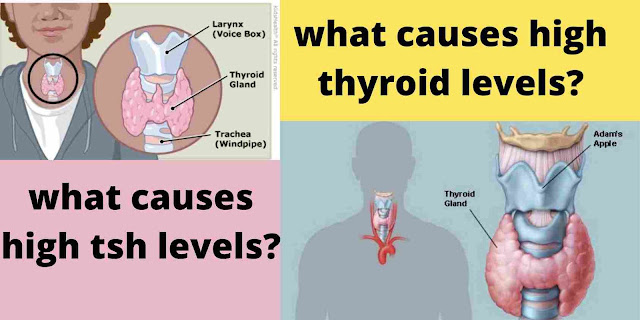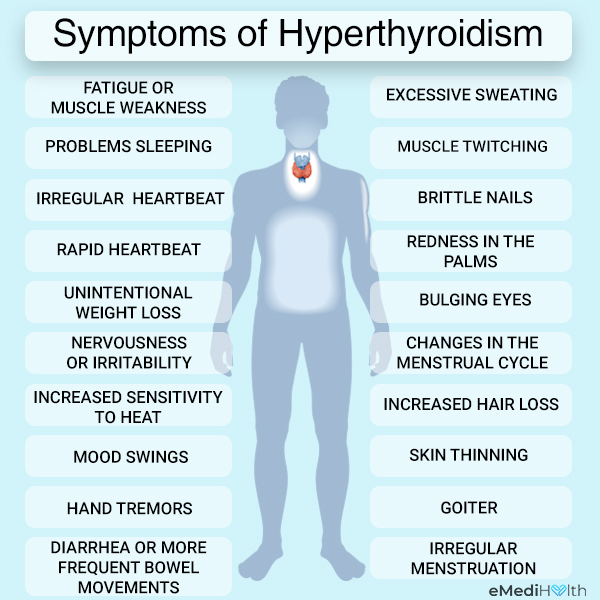what causes high thyroid levels?
What is hyperthyroidism (high thyroid)?
The condition of high thyroid levels (hyperthyroidism) affects the thyroid gland. Your thyroid is a small, butterfly-shaped gland located at the front of your neck. It produces tetraiodothyronine (T4) and triiodothyronine (T3), which are two primary hormones that regulate how your cells use energy. These hormones are released by your thyroid gland to regulate your metabolism.
Hyperthyroidism occurs when the thyroid produces too much T4, T3, or both. An overactive thyroid can be diagnosed and treated to relieve symptoms and prevent complications.
what causes high TSH levels?
Hyperthyroidism can be caused by a variety of conditions. Graves' disease is the most common cause of hyperthyroidism. It occurs when antibodies cause the thyroid to secrete too much hormone. Graves' disease affects more women than men. The disease tends to run in families, suggesting a genetic component. If your relatives have had the disease, let your doctor know.
High Thyroid Levels can also be caused by:
- Too much iodine, a key ingredient in T4 and T3
- Inflammation of the thyroid gland causes T4 and T3 to leak out
- In ovarian or testicular tumors
- Caused by benign thyroid or pituitary gland tumors
- Tetraiodothyronine is taken in large quantities as a dietary supplement or medication
Hyperthyroidism symptoms: What are they?
A high level of T4, T3, or both can cause an excessive metabolic rate. This is known as hypermetabolism. Hypermetabolic states can lead to a rapid heart rate, elevated blood pressure, and tremors in the hands. Additionally, you may sweat a lot and have a low tolerance for heat. Hyperthyroidism can cause frequent bowel movements, weight loss, and irregular menstrual cycles in women.
A goiter appears as a swelling of the thyroid gland, which can either be symmetrical or asymmetric. You may also have prominent eyes, which is a sign of exophthalmos, a condition related to Graves' disease.
Hyperthyroidism can also cause:
- Appetit increased
- Anxiety
- While restless
- And unable to concentrate
- Feeling weak
- With irregular heartbeats
- And trouble sleeping
- And thin, brittle hair
- Irritation
- And the loss of hair
- Vomiting and nausea
- As men develop their breasts
Symptoms that require immediate medical attention include:
- Diarrhea
- & breathlessness
- Unconsciousness
- quick, abnormal heart rate
Hyperthyroidism can also lead to atrial fibrillation, a dangerous arrhythmia that can lead to strokes and congestive heart failure.
What is the diagnosis of high thyroid level?
The first step in diagnosing is to get a complete medical history and physical examination. Common signs of hyperthyroidism include:
- Loss of weight
- with rapid heartbeat
- and high blood pressure
- and bulging eyes
- along with enlarged thyroid glands
To further evaluate your diagnosis, other tests may be performed. Examples include:
Test for cholesterol:
It may be necessary for your doctor to check your cholesterol levels. Having low cholesterol can be a sign of an elevated metabolic rate, which burns cholesterol quickly.
You can use these tests to determine your blood level of thyroid hormones (T4 and T3).
Test for thyroid-stimulating hormone:
A pituitary gland hormone called thyroid-stimulating hormone (TSH) stimulates the thyroid gland to produce hormones. TSH should be lower when thyroid hormone levels are normal or high. TSH levels that are abnormally low are the first sign of hyperthyroidism.
Test for triglycerides:
Triglyceride levels may also be tested. Low triglycerides can be a sign of an elevated metabolic rate, just as low cholesterol is.
Thyroid scan and thyroid uptake:
Your doctor can then determine if your thyroid is overactive. It can reveal whether the thyroid gland as a whole is overactive or whether it is just a single section of the gland.
Using ultrasonic technology:
An ultrasound can measure the size of the thyroid gland, as well as any masses within it. Ultrasounds can also be used to determine whether a mass is solid or cystic.
MRI or CT scans:
A CT or MRI can reveal whether a pituitary tumor is causing the condition.
Hyperthyroidism treatment:
Medicine
Methimazole (Tapazole) is an antithyroid medication that prevents the thyroid from producing hormones. It is a common treatment.
Iodine radioactive
According to the American Thyroid Association, over 70 percent of U.S. adults with hyperthyroidism receive radioactive iodine treatment. This destroys the hormone-producing cells.
Dry mouth, dry eyes, sore throat, and changes in taste are common side effects. To prevent radiation from spreading to others, precautions may need to be taken for a short period following treatment.
Surgical procedures
Your thyroid gland may be surgically removed in part or whole. If you have an underactive thyroid that secretes too little hormone, you will need thyroid hormone supplements to prevent hypothyroidism. Beta-blockers such as propranolol can also reduce your rapid pulse, sweating, anxiety, and high blood pressure. This treatment is generally well-tolerated.
To improve symptoms of high TSH levels, you can do the following
Calcium and sodium should be included in a proper diet, especially to prevent hyperthyroidism. Create healthy guidelines for your diet, nutritional supplements, and exercise with your doctor.
Also, high thyroid levels can cause your bones to become thin and weak, which can lead to osteoporosis. You can strengthen your bones by taking vitamin D and calcium supplements during and after treatment. You can ask your doctor how much vitamin D and calcium you should take each day.
Perspectives
An endocrinologist specializes in treating bodily hormone systems, so you may be referred to one by your doctor. Stress and infections may cause thyroid storms. When a large amount of thyroid hormone is released, it causes a sudden worsening of symptoms. Thyrotoxicosis, thyroid storm, and other complications can be prevented with treatment.
Hyperthyroidism's long-term outlook depends on the cause. Some causes can be managed without treatment. Other conditions, such as Graves' disease, worsen over time without treatment. Complications of Graves' disease can be life-threatening and affect your quality of life in the long run. A timely diagnosis and treatment improve the long-term outlook.





Feel free to ask me any questions you might have